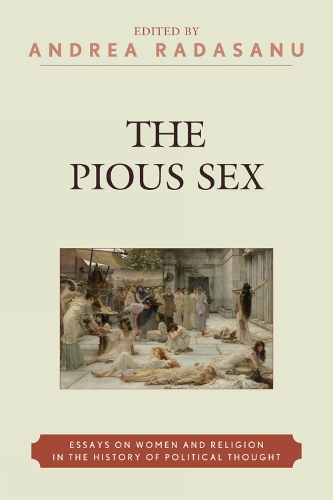
The Pious Sex: Essays on Women and Religion in the History of Political Thought
(Paperback)
Publishing Details
The Pious Sex: Essays on Women and Religion in the History of Political Thought
By (Author) Andrea Radasanu
Contributions by Amy L. Bonnette
Contributions by Lise van Boxel
Contributions by Catherine Connors
Contributions by Eve Grace
Contributions by Heather King
Contributions by Paul Ludwig
Contributions by Clifford Orwin
Contributions by Kathrin H. Rosenfield
Contributions by Dana Jalbert Stauffer
Bloomsbury Publishing PLC
Lexington Books
1st March 2010
United States
Classifications
Tertiary Education
Non Fiction
Gender studies: women and girls
Political science and theory
200.82
Physical Properties
Paperback
302
Width 156mm, Height 230mm, Spine 22mm
445g
Description
The Pious Sex strives to enlighten the reader with respect to the relationship between women and religion. The notion that there is a special relationship between women and piety may call to mind the worst of the prejudices associated with women over the ages: the characterization of women as superstitious and inherently irrational creatures who must be kept firmly in hand by the patriarchal establishment. The suggestion that there is a special relationship between women and piety conjures up the most oppressive picture of womanly virtue. The contributors of this volume revisit the claim that women constitute the pious sex and investigate the implications of such a designation.
This collection of original essays examines the relationship between women and religion in the history of political thought broadly conceived. This theme is a remarkably revealing lens through which to view the Western philosophical and poetical traditions that have culminated in secular and egalitarian modern society. The essays also give highly analytical accounts of the manifold and intricate relationships between religion, family, and public life in the history of political thought, and the various ways in which these relationships have manifested themselves in pagan, Jewish, Christian, and post-Christian settings.
Reviews
A sparkling collection of essays that examines the old assumption that women are the pious sex. The authors take testimony from the highest sources in philosophy, poetry and religion as they begin the taskso long postponedof studying women as they are. This is feminism as it should be. -- Harvey Mansfield, Professor of Government, Harvard University; Senior Fellow, Hoover Institution
Author Bio
Andrea Radasanu is an assistant professor of Political Science at the Northern Illinois University.
